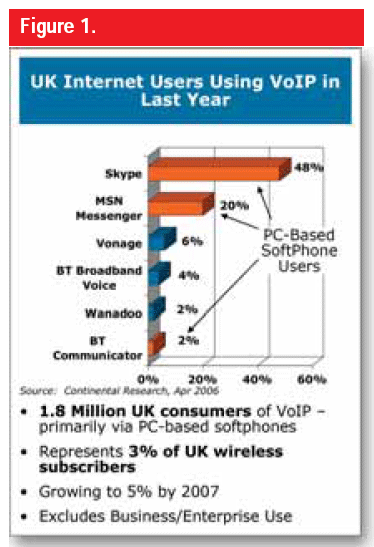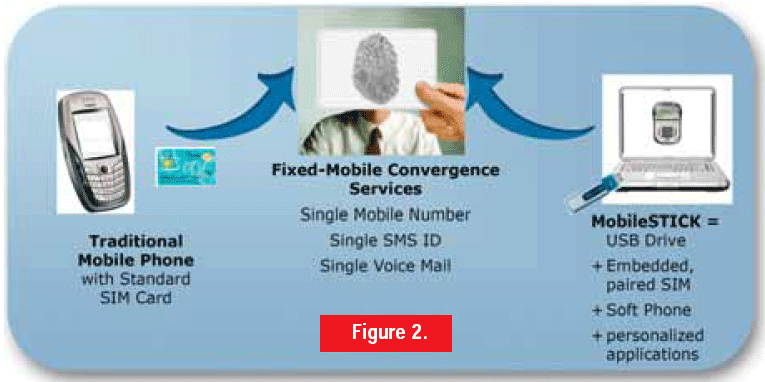|
Fixed mobile convergence is a term that conjures up many definitions. Whether a mobile, integrated or cable service provider, each type of carrier usually defines FMC according to its own natural biases. For example, Mobile carriers hold a handset-centric view of FMC and usually speak in terms of dual-mode handsets. However, a large opportunity exists for linking PC-based Internet softphones to mobile services.
Increasingly, the PC is becoming a popular device for communications, regardless of whether it is email, messaging, voice, or video. Consumers and business users are finding its power, flexibility, form factor and access to increasingly ubiquitous broadband Internet provides a valuable addition to their choice of communication devices.
And for service providers looking to gain a foothold in fixed-mobile convergence, PC softphones provide a time to market and usability advantage relative to dual-mode handsets
What is a PC-based Softphone?
Most consumers have started to explore PC Softphones through their instant messaging communicators. These IM clients provide free calls between IM clients and cheap outbound VoIP calls to public telephony networks around the world. In addition, for a fee, inbound calls, voicemail, and outbound SMS are available.  ; ;
How Large is the Market?
The growth of PC-based communications with soft phones has been explosive in the past few years. According to Continental Research, a large percentage of UK Internet users have used VoIP via PC-based software in the last year (See Figure 1). The most popular of these is Skype. This study indicates that 1.8 million UK subscribers, or 3% of the entire UK mobile subscribers have used PCbased softphones. In addition, this trend will continue to grow to 5% in 2007.
In the United States, according to In-Stat, roughly 50% of all households who have used VoIP have used PC softphones, as opposed to the facilitiesbased VoIP like Vonage. This equates to roughly 5% of households experimenting with PC softphones. Skype is the most popular of these used for Voice telephony.
Skype Shortcomings
Today, Skype and its current softphone competitors have excellent instant messaging capabilities, but they have several shortcomings relative to telephony and mobile services. For example, Skype:
• Requires yet another phone number for incoming calls
• Connects to the PSTN on only a best effort basis, frequently resulting in poor quality calls
• Works via non-standards based technology, therefore difficult to integrate with other networks
• Provides limited integration with mobile networks, resulting in expensive, uni-directional SMS 
Mobile’s Converged Softphone Opportunity
While Skype is currently a limited threat to mobile minutes, it does signify a preference by a growing segment of the market to use the PC as a communications device. Mobile providers have an opportunity to address this market, and do so in a differentiated and profitable way (See Figure 2).
With a converged softphone, mobile carriers can build on their existing mobile subscriber base and lead the charge into fixed-mobile converged services. Converged softphones do not face the same production hurdles as dualmode handsets. Therefore, they can act as an early-market product that will prove the business case for a larger, later dual-mode handset solution.
Relative to Skype, a converged softphone would hold many advantages. It can:
• Extend the existing mobile number into the internet, thereby simplifying subscribers’ communications and enhancing reachability via a single number identity
• Provide an easy-to-use, converged messaging platform that is consistent across SMS and IM
• Stimulate MMS usage by combining access to content stored on the PC with drag-and-drop simplicity
• Build on existing billing and customer service relationships
• Establish a secure platform for a multitude of compelling future convergent applications
One Approach: MobileSTICK
BridgePort Networks, a winner of the World Economic Forum’s Technology Pioneers award, has a mobile-centric converged softphone solution called MobileSTICK. It address three elements that are key to a commercially viable converged softphone:
• A secure end-user softphone client,
• The convergence of Internet with circuit-switched mobile networks, and
• Integration and extension of existing and new mobile services.
A logical way to address security and network authentication issues is to use existing SIM card technology. For example, BridgePort Networks offers a SIP based client that automatically launches from a portable USB Key. The USB Key has a SIM card that authenticates back to the mobile network.
To carry authentication messages, other signaling, and bearer traffic over the Internet and interwork with the mobile network, a convergence gateway is required.
BridgePort Networks’ NomadicONE Convergence Gateway performs this function, acting as a both a SIP registrar and a Serving Mobile Switching Center (S-MSC).
Finally, the convergence gateway must extend a subscriber’s exiting mobile number and service seamlessly across mobile networks and the Internet. BridgePort Networks achieves this single number identity via interactions with the mobile networks’ Home Location Register (HLR)
All of these capabilities come together in the MobileSTICK solution. The solution is designed to provide convergence mobile services across PC and handset, without requiring a second phone number or change to the existing handset.
Strategic Directio
For integrated carriers, a converged softphone is a natural addition to their bundling strategy. It provides a low-cost method to tie Mobile, DSL and VoIP together. It also establishes a platform for integrating emerging IP services (video, audio) that benefit from network authentication, quality of service, and digital right management.
Susbcribers recognize the growing relevance of this product category. Some projections point to over 50 million converged softphones by the end of 2008 worldwide. However, it is too soon to tell whether Mobile and Integrated carriers will seize this opportunity or cede the opportunity to disruptive players like Skype who are likely to start encroaching on Mobile markets.
Mike Mulica is the President and CEO of BridgePort Networks (news - alert) (http://www.bridgeport-networks.com), a leader in mobile to Voice-over-IP roaming. With more than 20 years in the telecommunications industry, Mulica has built a reputation for opening global markets for innovative software solutions.
|

